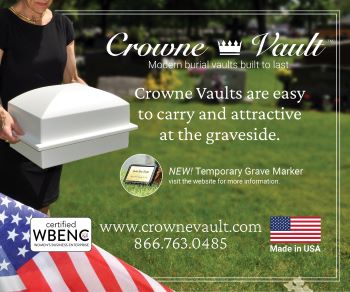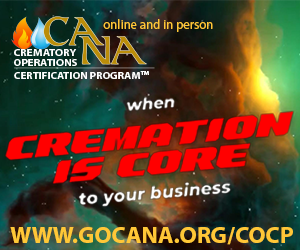Will the First Amendment change funeral licensing?

In America our court systems help define what is a Federal issue and what is an issue for a lesser proportion — say a “State’s Rights Issue” or an issue of a city or county within a state. And, sometimes the decision can be confusing and the decision on how to approach the issue, if a State’s Rights Issue, will generally be different from state to state.
Now, I’m not an attorney, but it certainly appears to me that most of the laws that govern funeral homes in the United States are state laws, and it appears that the differing states have much to say about how Death Care laws and rules are applied in their jurisdictions. It’s easy to see that in how the rolling out process of the legality of human disposition for alkaline hydrolysis and natural organic reduction (human composting) is happening state by state.
On the other hand there are national issues that can be regulated by Congress and/or required by a national governmental organization such as the Federal Trade Commission, but for the most part, I see Death Care rules and regulations put into effect on a state-by-state level.
For instance, these new forms of human disposition that are becoming legal are being rolled out on a state-by-state basis rather than a federal law being put on the books. In essence, it is up to each state to decide if the process of those forms of human disposition will be legal in their respective states. It’s a very contemporary example of a “State’s Rights Issue”.
I mention this because sometimes it is interesting to note that it can seem that two states go in complete opposite directions as to what rules they want to use in defining the death care processes in their state and how strict they want to be with licensure.
For instance, as you can see in this article, the state of Colorado did what they call a “Sunset” of funeral rules back in 1983. At that time they “rolled back” the licensing of funeral homes and embalmers and opened the business up to people without those licenses. Well, we are 40 years past that time, some things have not went so well in the death care community in Colorado, and now the state legislature is looking at re-instating regulations such as licensing. Potential laws and regulations seem to be being proposed in the Colorado state legislature this year.
And, at the other end of the spectrum, the state of Indiana, which does regulate funeral directors and funeral homes has just had a preliminary injunction granted to allow a non-licensed person to operate what she describes as a “Death Doula” business. Here’s what an article from Fox 59 of Indianapolis says about the issue as of December 2023:
“An Indiana woman who provides end-of-life guidance for clients can keep her business open for now.
Lauren Richwine of Fort Wayne had been forced to stop operating Death Done Differently after receiving a cease and desist order from the Indiana Attorney’s General office claiming she does not hold a funeral director license for herself or a funeral home license for her business.
On Tuesday (December 19, 2023), U.S. District Court Judge Holly Brady issued a preliminary injunction that allows Richwine to keep the business open while her legal challenge to the claims she’s violating Indiana’s funeral home laws plays out in the courts.”
Of that temporary decision, Death Doula Richwine had this to say, “I’m incredibly thankful that I can continue to facilitate important discussions with my clients about their end-of-life options while our lawsuit is ongoing. All Hoosiers deserve to know their choices at the end of life, so they can make an informed decision that best fits their unique needs.”
Here’s a portion of the temporary injunction ruling for this case
Here is the website for “Death Done Differently”, the death doula business involved in this dispute.
Funeral Director Daily take: Again, I’m not an attorney and I certainly don’t understand all the nuances of this or any other case. However, I have my opinion on what, for the sake of consumer or public health reasons, should probably be regulated in our profession.

Tom Anderson
Funeral Director Daily
It’s pretty easy for public health reasons to understand that anything that involves the handling of a deceased bodily human remains should be done by trained and licensed personnel. There’s communicable disease issues that come to the forefront of that thought process. Therefore, these situations should probably require a license. As a matter of fact, the temporary injunction on the Indiana case seems to actually argue that case.
But, what about giving advice on grief, memorial services, and those other situations that are prevalent in death care now where there is no body present? Will funeral planners or Death Doulas become a growing profession much like wedding planners?. . . .There are situations where one needs to be licensed in relation to the wedding. . . such as those that can sign a marriage document. . . or in providing the dinner and drinks at a wedding that probably requires a caterer’s license and/or alcohol license.
However, wedding planners can hire licensed people to perform the services such as pastors, priests, and certain celebrants, and can arrange with those that have licenses for catering and/or alcohol and get that type of “licensed” service by hiring these third party vendors. And, none of that stops wedding planners from receiving compensation for their expertise in advising, planning and executing the wedding that is being arranged.
Will we get to that point in Death Care? . . . .Where unlicensed or untrained “Funeral Planners” or “Death Doulas” can sub-contract with licensed operators such as trade embalmers in order to move forward with their businesses? For many years “licensure” has been a moat to protect funeral homes. . . . . will some who want to work as “Death Doulas” or “Funeral Planners” be able to penetrate that moat in the future?
That question and how it is answered may well be “The Question” on how profitability of traditional funeral homes is affected moving forward.
Even while Colorado is seeing a need for more licensure for the Death Care profession, this case in Indiana may go just the opposite way in limiting the amount of licensure needed to operate a Death Care business. . . . .Someday we may look back at this case as one that makes Death Care a commercialized “free for all”.
More news from the world of Death Care:
- Prosecutors: Texts show Colorado funeral home owners planned to get rid of neglected bodies. Oklahoma News 4 — Oklahoma City (OK)
- How soon before Houston runs out of land for grave sites? Here’s what the experts say. Houston Landing (TX)
- New $US 12 million mortuary planned for Northamptonshire. BBC (Great Britain)
- “Relief”: How a bit of faith and promise put a Griffin funeral home back in business one year after a devastating storm. Video news story and print article. WMAX Channel 13 – CBS – Macon (GA)
Enter your e-mail below to join the 3,454 others who receive Funeral Director Daily articles daily:
“A servant’s attitude guided by Christ leads to a significant life”




















